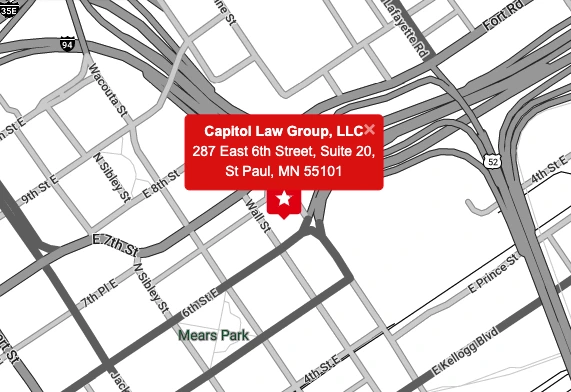The Five Levels of CSC and St. Paul Felony Lawyers

Because they must cover a wide variety of conduct, Minnesota’s Criminal Sexual Conduct laws are extremely complex. A few of these incidents start rather innocently and end rather badly. Most of them start very badly and end even worse. If proven in court, all these incidents deserve stiff punishment, but some are obviously worse than others.
Largely depending on the facts, St. Paul felony lawyers may have several defensive options. In a few cases, consent may be a defense. In almost all CSC cases, lack of proof may be an even better defense. That’s especially true if the prosecutor does not have solid physical evidence, like a DNA sample and a rape kit, or if such evidence is tainted.
First Degree CSC
Section 609.342 is basically the aggravated rape statute in Minnesota. If the alleged victim is under 13, sexual contact is sufficient. Here are some specifics:
- Age: In this context, the age limit is normally either 13 or 16 in Minnesota. These offenses are strict liability offenses. It is not a defense that s/he looked older or lied about his/her age. However, a St. Paul felony lawyer may be able to use such evidence to reduce punishment. Additionally, some Romeo & Juliet age exceptions apply. For example, if the defendant was either less than four years older than the alleged victim at the time of the offense, the charges may not hold up in court.
- Reasonable Fear of Imminent Harm: This standard sounds subjective, but it is actually rather objective. Basically, the defendant must make a credible threat of violence or use enough physical force to cause an injury. If the defendant or an accomplice had a dangerous weapon, reasonable fear of imminent harm is easier to prove.
- Force, Coercion, or Impairment: Many first-degree CSC prosecutions rest on one of these three grounds. The force must be more than the penetration. Generally, the alleged victim must have another physical injury as well. Additionally, there is a fine line between coercion and cajoling or bribery. Only coercion is illegal. Finally, there is a difference between physical or mental impairment and physical or mental incapacity. Impairment is permanent and usually natural. Incapacity is usually temporary and artificial, such as alcohol or drugs.
First-degree CSC punishments are quite stiff. The maximum prison sentence is thirty years; the minimum is twelve years. Additionally, defendants must serve an additional ten years of conditional release (parole) after discharge. St. Paul felony lawyers may be able to reduce the minimum, but such reductions are difficult. Essentially, the judge, alleged victim, prosecutor, alleged victim’s family, and sex offender evaluator must all agree.
Second Degree CSC
Section 609.343 is the aggravated sexual assault statute in Minnesota. The same aggravating circumstances described above apply in second-degree CSC prosecutions. However, there is no penetration requirement. Sexual contact is sufficient. That contact may occur while the alleged victim is fully clothed.
Significantly, coercion must accompany the sexual conduct. If the defendant cajoled, bribed, or paid for the sexual contact, the defendant may be guilty of another offense, but second-degree CSC charges will probably not hold up in court.
Since 609.343 is a slightly less serious offense than first-degree CSC, the punishment is a bit less severe. The maximum and minimum sentences drop to twenty-five years and seven years, respectively. The conditional release term is the same, as are the grounds for reducing the minimum sentence.
St. Paul Felony Lawyers and Third Degree CSC
Section 609.344 is the non-aggravated rape statute. If the defendant penetrated the alleged victim and none of the above aggravating circumstances apply, Ramsey County prosecutors will charge the defendant with third-degree CSC. The penetration is illegal if the:
- Alleged victim was under 13, 15, or 16, depending on the facts,
- Defendant used coercion or force, as outlined above,
- Defendant knew or should have known the victim was physically or mentally incapacitated, as outlined above,
- Alleged victim and defendant had a therapist-patient relationship at the time, the alleged victim was a former therapy patient who was emotionally dependent on the defendant, or a former therapist deceived the alleged victim,
- Defendant falsely said the contact had a legitimate medical purpose,
- Alleged victim and defendant had a clergy-parishioner relationship and the contact occurred during a pastoral counseling session,
- Defendant was a volunteer or employee at a juvenile or correctional facility where the alleged victim was in custody or seeking treatment,
- Defendant was a DHS transportation provider who had sex with the alleged victim immediately before or after transporting him or her,
- Alleged victim and defendant had a massage therapist-patient relationship and the nonconsensual sex happened during or immediately before or after a massage.
Once again, force or coercion is the most common third-degree CSC trigger. Most of the others are relationship-based.
There is no mandatory minimum prison sentence. Maximum incarceration for third-degree CSC is between five and fifteen years, depending on the facts. Convicted defendants must also serve a period of conditional release, but the length varies.
Fourth Degree CSC
Section 609.345 is the non-aggravated sexual assault statute. Any non-consensual sexual contact is usually fourth-degree CSC. The maximum prison sentence is ten years, and there is no minimum. Once again, conditional release provisions usually apply, and a St. Paul felony lawyer may be able to reduce part of this sentence.
Fifth Degree CSC
Section 609.346 is the final felony CSC law. This provision is basically aggravated indecent exposure. Defendants commit this offense if they attempt to remove the alleged victim’s clothes with the intent to sexually gratify themselves or expose themselves to minors under 16. Sometimes, fifth-degree CSC is a gross misdemeanor. The felony version could mean up to seven years in prison.
Reach Out to a Dedicated Attorney
Regardless of the facts, CSC is one of the most severe offenses in Minnesota. For a free consultation with an experienced St. Paul felony lawyer, contact Capitol City Law Group, LLC. Go online now, call us at 651-705-8580, or stop by 287 6th St E, Suite 20, St Paul, MN 55101.




